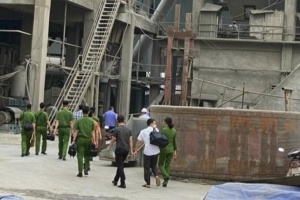Accelerate the Implementation of Women, Peace and Security
(LĐXH)- To commemorate the first year anniversary of the International Conference on Women, Peace and Security (WPS) – “Strengthening Women’s Role in Building and Sustaining Peace: From Commitments to Results,” organized in Hanoi in December 2020, over 100 international practitioners on Women, Peace and Security (WPS) from around the world, political leaders, representatives of UN Agencies in Vietnam, socio-political and women’s organizations and Vietnamese academia will gather once again in Hanoi at the international workshop “Accelerating the Implementation of the Women, Peace and Security (WPS) Agenda: The Role of National Action Plans (NAP)” to discuss promising practices on the implementation of WPS agenda at the national level around the world.
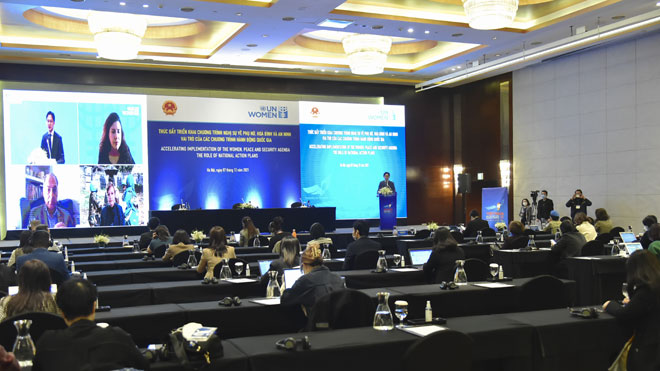
All of these will come together with the common goal of paving the way for the possible development of a NAP, or a similarly effective and efficient WPS framework for Vietnam.
To strengthen the implementation of the WPS agenda, UN Member States have formulated and adopted NAPs on WPS. The WPS NAPs illustrate how UN Member States prioritize different aspects of the WPS agenda according to their national settings,and provide information on how the WPS activities are governed, funded, and monitored. They are national-level strategy documents that outline a government’s approach and course of action for localizing the WPS Agenda.
In December 2020, the WPS agenda was re-enforced by the Hanoi Commitment to Action, which was endorsed by 75 countries, and launched on the 20th anniversary of UNSCR 1325 through the global WPS Workshop hosted by Vietnam.
Inequality is a key driver of social unrest and conflict. Peace and security for all can only be achieved and sustained if peace and security for women and girls is guaranteed. In 2021, the COVID-19 pandemic has tested governments, women, and other peacebuilders. It has added yet another layer of risk and complexity to conflicts. It has also further widened inequalities and threatened to undermine human rights.
Preparing Vietnam to be better equipped with strategies and resources to respond successfully to those peace and security challenges, using the comprehensive WPS Agenda approach of prevention, protection, participation, relief and recovery, and frameworks like that of a National Action Plan are useful strategies for all States in the consideration of sustaining peace and to further develop the country.
Additionally, they aid countries in the achievement of the Sustainable Development Goals and enable nations to fulfill other international commitments to gender equality and the promotion of women and girls’ equal access to social, economic, business and professional opportunities, access to resources and services, and agency in decision-making processes.
The workshop today will be an open space for the sharing of many WPS NAPs, and for key stakeholders to questions on the effectiveness, efficiency and challenges of each NAP, including how the NAPs are aligned with national development strategies, how they are financed, how they are in support to women empowerment agenda across sectors, how they promote inclusive and participatory inter-ministerial coordination, how they are a way for the government to realize its international commitments, and how they are able to support government to respond swiftly in times of crisis, like the COVID-19 pandemic, to protect women and girls from additional harm.
Affirming the important role of women in the prevention and resolution of conflict and peacebuilding, the WPS agenda was first formalized by the UN Security Council Resolution 1325 (2000), with the subsequent Resolution 9, and provides a holistic approach to peacebuilding and security through four pillars - Prevention, Participation, Protection, and Relief and Recovery – with respect to the human rights and dignity of women and girls and in tackling the root causes of conflict to create sustainable peace./.
Hong Minh
Tags:
UN Women
WPS agenda
-
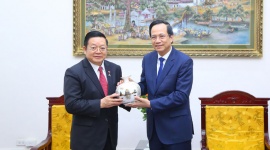 Minister Dao Ngoc Dung received the ASEAN’s General Secretary
24-04-2024 10:38 35
Minister Dao Ngoc Dung received the ASEAN’s General Secretary
24-04-2024 10:38 35 -
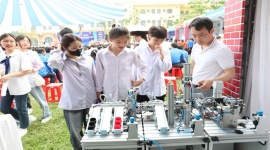 Ha Nam province promotes career orientation for students
23-04-2024 14:28 49
Ha Nam province promotes career orientation for students
23-04-2024 14:28 49 -
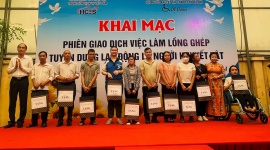 Hundreds of job opportunities for people with disabilities in Hanoi
17-04-2024 10:22 29
Hundreds of job opportunities for people with disabilities in Hanoi
17-04-2024 10:22 29
-
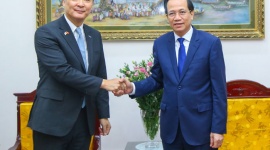 Minister Dao Ngoc Dung received the Chairman of the Korea International Cooperation Agency
21-03-2024 14:14 48
Minister Dao Ngoc Dung received the Chairman of the Korea International Cooperation Agency
21-03-2024 14:14 48 -
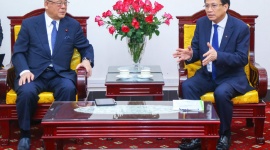 MoLISA proposing Japan to expand occupations to receive Vietnamese workers
18-03-2024 11:12 55
MoLISA proposing Japan to expand occupations to receive Vietnamese workers
18-03-2024 11:12 55 -
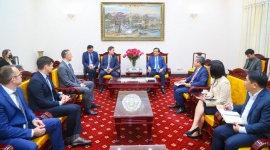 Promote labour relations between Vietnam and Hungary
18-03-2024 09:55 15
Promote labour relations between Vietnam and Hungary
18-03-2024 09:55 15
English Review


Minister Dao Ngoc Dung received the ASEAN’s General Secretary
English Review | 24-04-2024 10:38 35



